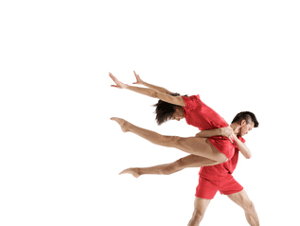Global influence on dance
Julieta Cervantes
The following is not a full transcript; for full story, listen to audio.
Dance and music are key ingredients in the life of another American, choreographer Karole Armitage. She is well known in Europe too, having spent a lot of her life and career there. Armitage takes her choreography in unexpected directions. Cason point, her signature punk ballets.
Her group, Armitage Gone Dance is now beginning a tour of the United States and Europe. Karole Armitage talked to "The World" about her work, and the kind of music that she’s is attracted to. And that includes the work of late Hungarian composer Gyorg Ligeti. She used his music to create a dance called "Ligeti Essays."
"What Ligeti did in this music, was he took a lot of folk traditions from Hungary, and he combined them with influences from Asia," said Armitage. "And this made this very peculiar world of sound and feeling, that is very subtle and dreamy. And in this particular case, the dancers are carrying lanterns. You know, it’s kind of like moonlit, and it’s just about the beautiful feeling of nature and culture coming together."
Armitage also worked with Gyorg Ligeti’s son, Lucas, "Well, I had worked with the father’s music, and he was very, very influenced by African polyrhythms and the thought in African music, which was quite unusual. And his son has sort of taken that another step further. Lucas has spent a great deal of time in Africa, and he actually formed a band that’s called Burkina Electric, he’s one of the co-founders.
"They’re from Burkina Faso, and they use traditional Burkina Bay music, and they combine it with western techno and electronics."
Armitage finds that the interpretation on the part of the dancer is different, depending on where they’re from, "And this is an interesting thing, and this is part of the reason I like having people from all different parts of the world.
"I have two Japanese dancers, and there’s no doubt that they are particularly good at making movement that is full of curves, because their writing is full of curves. And I think the whole asymmetrical sensibility of Japanese art is very natural to them, and it’s almost got kind of curves and a feeling of nature. And of course, nature is never straight lines. And in nature is much more important in their tradition, than it is in ours. And all of this comes out in how they dance."
PRI’s "The World" is a one-hour, weekday radio news magazine offering a mix of news, features, interviews, and music from around the globe. "The World" is a co-production of the BBC World Service, PRI and WGBH Boston.
